There’s been a tremendous amount of chatter recently about rich snippets vanishing from Google search results, whether it’s Amazon losing their review aggregate snippets or a wholesale reduction in video snippets.
What we’re really talking about are changes to the rich snippets algorithm.

That’s right, we need to go deeper. There’s an algorithm within the algorithm.
Here’s what I know about the rich snippets algorithm based on observation and conjecture as well as statements from Google representatives. I’ll also sketch out some theories on how Google might be replacing many rich snippets with Knowledge Graph panels and carousels.
Rich Snippets History
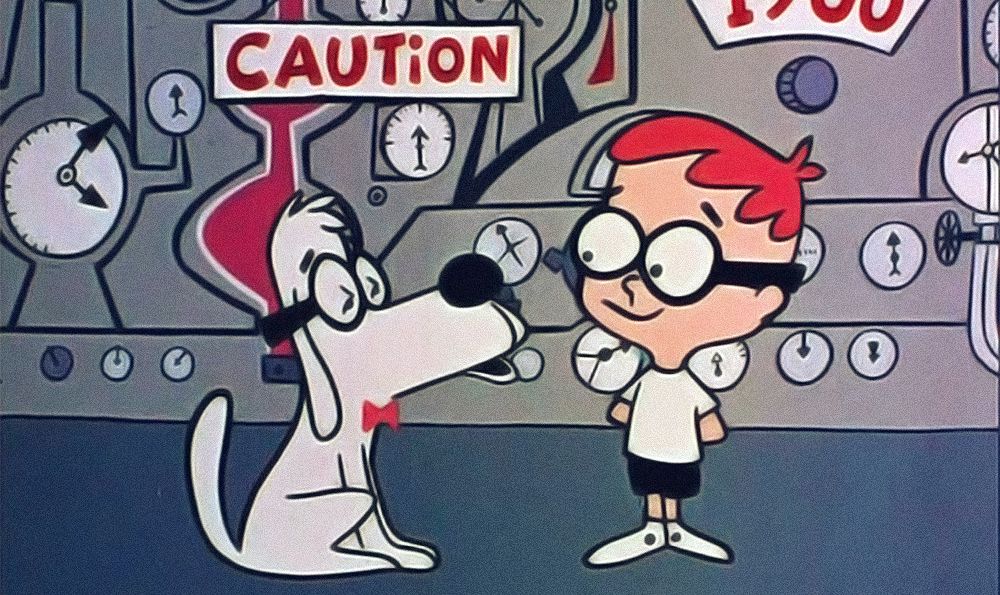
Lets start at the beginning. Rich snippets were first introduced by Google on May 12, 2009. The strange thing is Google was the last search engine to embrace rich snippets.
For a long time Google didn’t want to employ a feature that would be naturally biased toward sites with greater development resources. In short, Google wanted to keep a level playing field. You still see some of this mentality in the Data Highlighter feature in Google Webmaster Tools.
But once they started down the rich snippets road Google all-in, launching Schema.org on June 2, 2011. Sure it’s a joint venture between search engines but lets be real, the main author here is Google.
Not Your Ordinary Result
Rich snippets are fancy results or results on steroids. They usually contain a visual element such as stars or a thumbnail image.
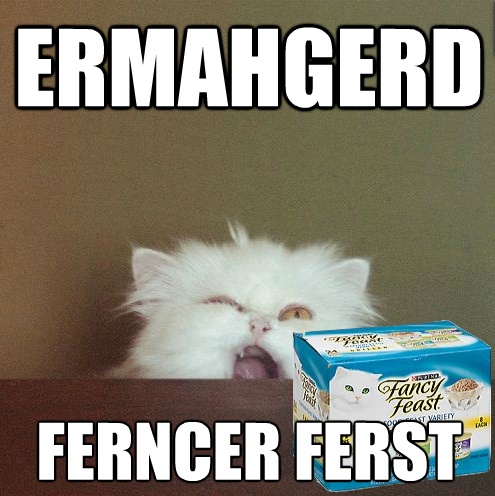
Whether they’re stars, additional links, thumbnail images or video captures, these results stand out from the crowd. As such, they draw both the eye and clicks.
Whitelist Days Of Yore
In the old days (circa 2010) I was working with PowerReviews and, by proxy, a number of eCommerce companies who were chomping at the bit to get the review aggregate snippet on their results.
Those stars were extremely powerful in those early days. Anything shiny and new will have that initial heightened response. The review rich snippet is still valuable but less so now that the novelty has worn off and there are multiple review rich snippets per result.
At the time, it was all about interfacing with the ‘rich snippets team’ and getting them to ‘turn on’ your snippets. As rich snippets grew in popularity and expanded to new types this non-algorithmic approach was untenable and simply … un-Googly.
Rich Snippets Algorithm
It shouldn’t be a surprise that there’s a rich snippets algorithm. Google states it clearly in their rich snippets guidelines.

For a long time this algorithm was rather basic and disconnected from other search quality signals. It wasn’t until the release of Panda 4.0 that Google integrated search quality signals with the rich snippets algorithm.
That’s not entirely true. Prior to that they’d done something because the review aggregate snippets for one of my clients just up and vanished one day.
I scratched my head and for months in early 2014 had the team tweak the code and fix every stray microdata error or potential conflict that could be responsible for what I assumed was some markup confusion. But nothing worked. In frustration I gave up, cursed Google, and put it on the back burner.
When Panda 4.0 was released this client’s review aggregate snippets magically returned along with a huge boost in rank. At the same time, I had another client hit by Panda 4.0 who lost their snippets and saw the Panda-typical decline in rank and traffic. So it became crystal clear.
Site quality is now part of the rich snippets algorithm.
From Google’s perspective it makes perfect sense. If the search quality team believes the site isn’t very good then why would Google render a rich snippet that would draw more attention and clicks to results from that site?
What that means is Panda Jail produces a double whammy of rank reduction and rich snippet suppression.
Validating Rich Snippet Suppression
You can validate the rich snippets suppression by using the site: operator for a query that should be showing rich snippets but isn’t. Here is a search for ‘dr waldo frankenstein’.
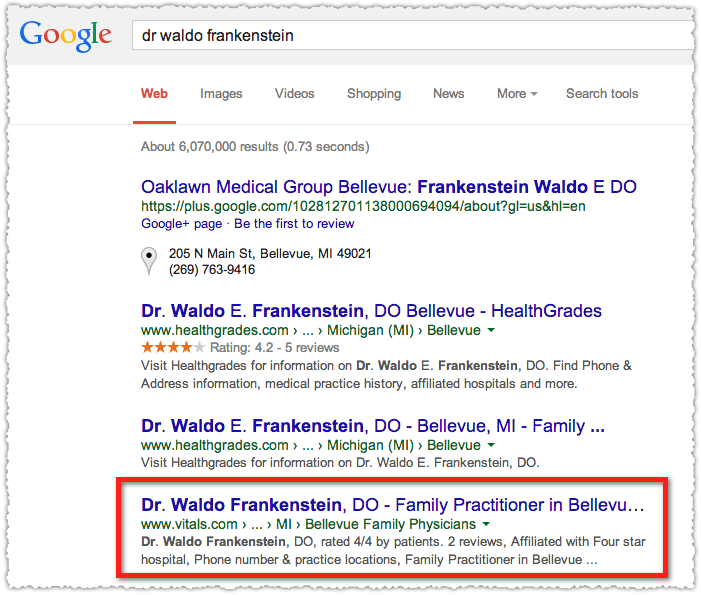
The vitals.com result does not have a rich snippet. Using my structured data testing tool bookmarklet I can tell the page does have the review aggregate markup in place. So then we just perform the same query with a site:vitals.com prefix.
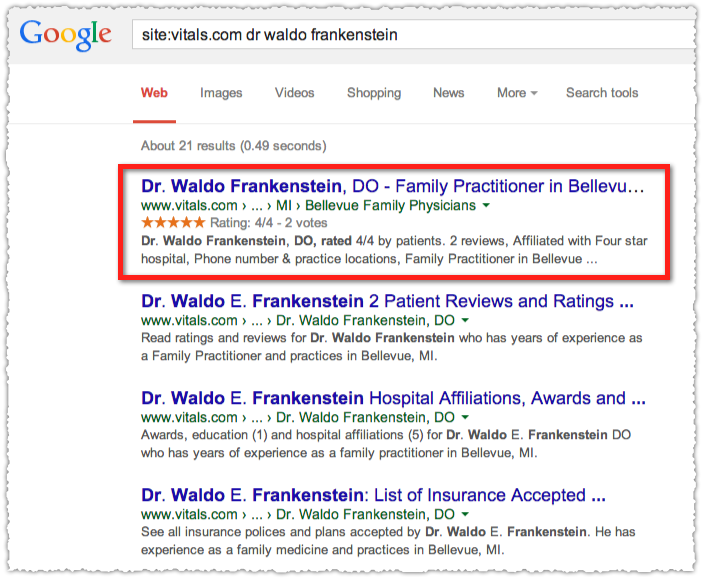
That’s the same page but this time the review aggregate rich snippet shows up. This is a clear case where Google is intentionally suppressing the rich snippet in normal search results.
Rich Snippets Relevance and Expertise
All of this doesn’t quite explain the big reduction in video snippets though does it? Many of the sites that lost video snippets weren’t Panda victims nor would you think they’d fall into some sort of non-authoritative bucket.
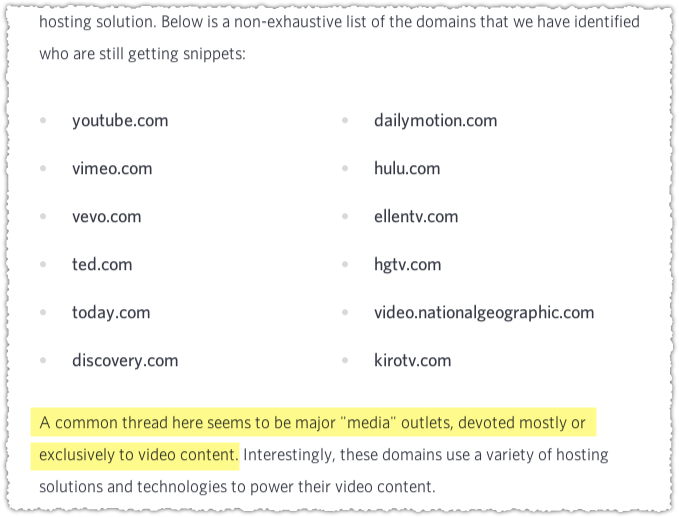
Casey Henry nails it in seeing the pattern. Those sites that are dedicated to video continue to get the video snippet. The algorithm seems to be looking for ‘topical’ expertise when rendering snippets. I don’t think Google wanted any ol’ site ‘hacking’ search results with a video result. (Yes, there was a cottage industry of folks doing this.)
I’ve seen this same ‘expertise’ issue occur on larger general interest sites. They may have received a recipe snippet before, but the new rich snippets algorithm decides not to render it because the site doesn’t have a focus or an expertise in recipes.
This expertise signal is a bit tough to pin down since there are other factors, such as overall site quality, involved. But it seems logical that Google is moving toward rendering snippets only when that site and snippet deliver relevance and expertise.
NASCAR SERPs?

The number of rich snippets per query might be a factor as well. Or if it isn’t, I think it will be soon. However, it is super dependent on the query.
For instance, search for ‘funny cat videos‘ and you get 8 video rich snippets, 7 of them from YouTube and one of them from Animal Planet. This makes a bit of sense since the query syntax makes it clear they’re looking for videos.
Sadly, a search for ‘funny cat‘ actually yields 10 video snippets, all from YouTube. I’ll give Google a pass with the query ‘funny cat’ since my guess is the overwhelming modifier is, in fact, ‘videos’.
So lets try the difference between ‘ombre hair’ and ‘ombre hair video’.
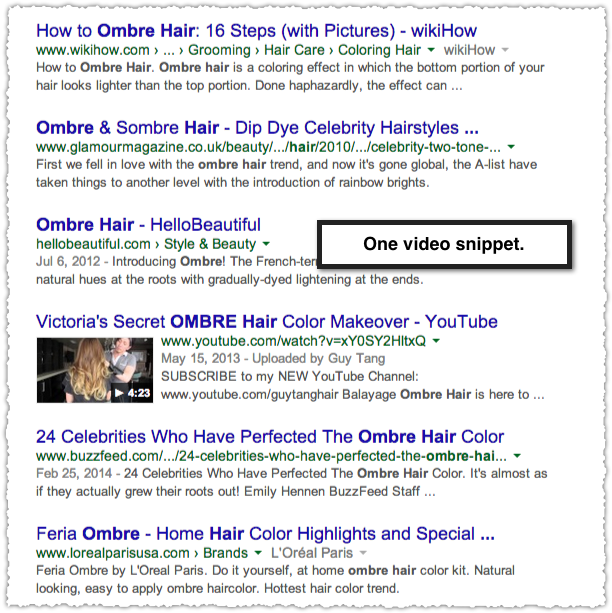
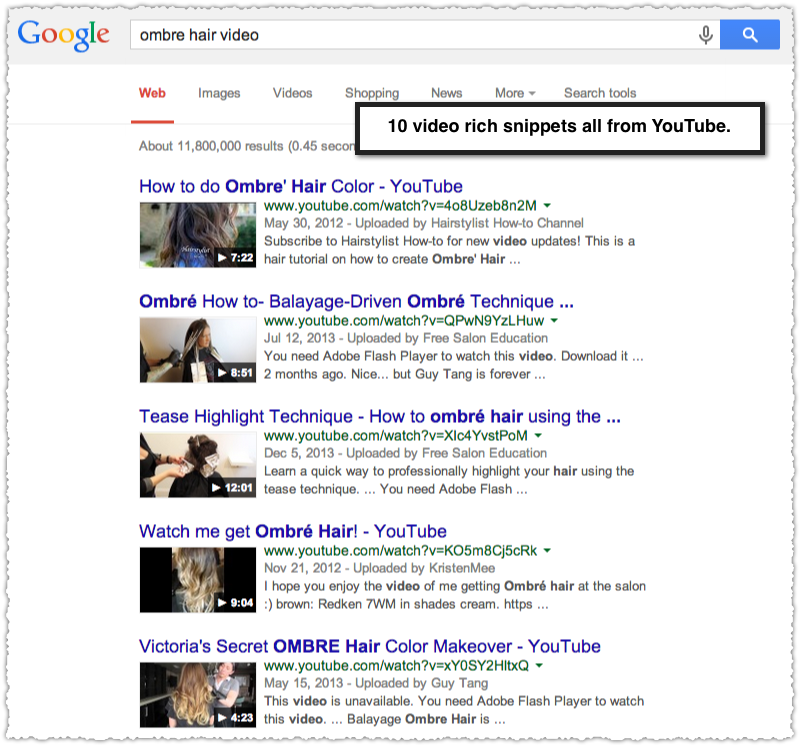
Sure enough you get just one video snippet with ‘ombre hair’ and a full 10 video snippets with ‘ombre hair video’. The only problem? They’re all from YouTube. In fact the first 15 are YouTube video snippets.
Look for a tweak to the rich snippets algorithm to dial back the YouTube host crowding issue. Even if YouTube is the most popular video destination it’s a public relations disaster to have it dominate to such an extent.
Similarly when you use ‘recipe’ in the query you get more recipe rich snippets. I’ve noticed that Google regularly removes the universal image result when you append the modifier ‘recipe’ to any ‘dish’ query.
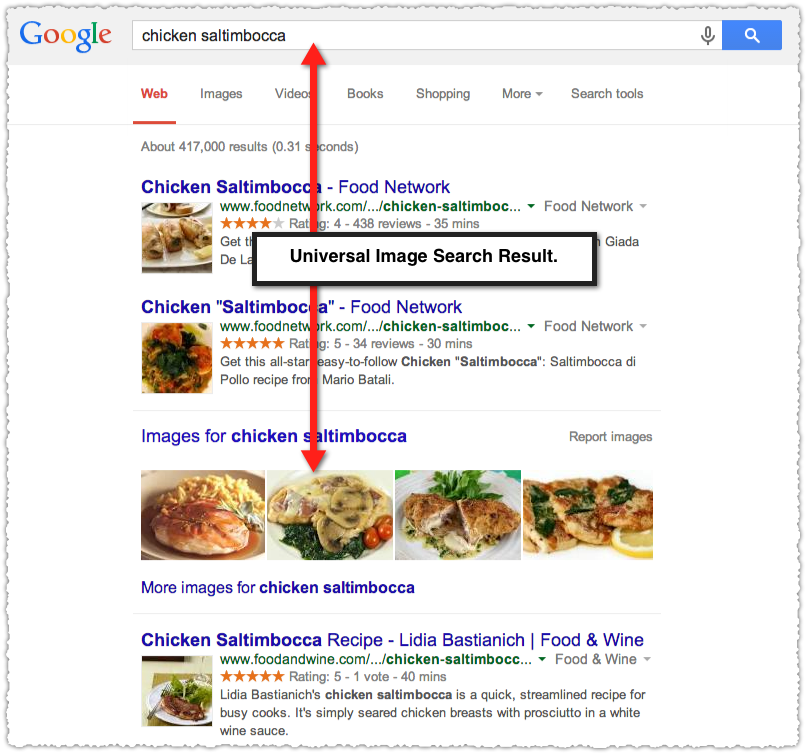
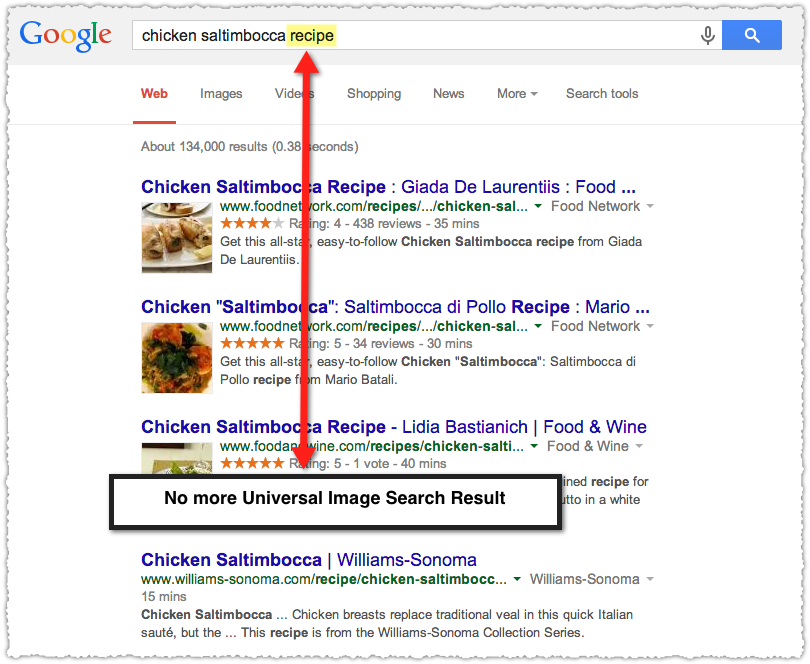
This makes sense. When you use the term ‘recipe’ in your query you’re looking for, well, recipes.
Query syntax and intent have an increasing influence on search results design and configuration.
But there are times when site quality and relevance aren’t in question and the only reason the rich snippet isn’t rendering seems to be that there are already a number of rich snippets in the results.
The problem is I can’t locate a good example of this signal at the time of writing. I had some examples but now they’re not working as advertised. So am I just reaching here? Maybe, but I don’t think so.
Too Much Of A Good Thing

The concept makes sense and there are recent precedents to support it. Google tweaked the number of authorship images showing up prior to removing them completely. No one wanted to see face after face in their results and certainly not the same face multiple times.
User experience consistency was the reason given for the elimination of authorship images. There’s a prominent mention about cleaning up ‘the visual design of search results’.
In a Google+ Google Webmaster Central hangout shortly afterwards John Mueller (Webmaster Trends Analyst but really so much more than that) seemed to go a bit further and speak to the user experience decisions Google makes with regards to rich snippets.
So for example, if we were to show the authorship photo for all search results, then maybe that would be too much for the majority of the users, even if we had that information. So that’s something where, in the beginning when only very few sites implemented authorship, maybe it made sense to show them all. Maybe now that a lot of sites are implementing authorship, maybe it makes sense to reduce that, or maybe to switch over to the text-based annotation.
Now John is talking about authorship snippets specifically but it seems like this would apply to any visual element in search results. And this isn’t the first time Google’s dialed back images based on user testing and research. The first social annotations Google applied (those small faces under results) weren’t well received by users (pdf) and quickly disappeared.
When everything screams to be looked at, you look at nothing.
Mark Traphagen does a bang-up job teasing it out in his authorship post on Moz and was extremely helpful in pointing me at specific comments. Prior to full removal Google developed a sort of tiered class system for authorship snippets detailed by Mark in his Great Google Authorship Kidnapping piece on Stone Temple.
The first class received the thumbnail image and the second class only got a byline. This might have simply been about site quality and not about the total number of snippets in a result.
Yet coupled with the comments from John after the fact, it makes me wonder if it also served to test visual snippet density.
Choosing Favorites Is Hard

I think Google is concerned about making the results too cluttered. From the start Google has maintained a type of less is more approach. Just look at their home page.
So at some point it makes sense to me that only a certain number snippets would render per query result, varying by the topic and query syntax. But which results get the rich snippet would make a humongous difference and become a bone of contention.
Do the rich just get richer? Or does the one site that has more topical expertise get the snippet over a larger national brand?
Google hasn’t had to deal with this problem in large part because the adoption of markup has been slow. But as more sites add structured data, how does Google deal with search results with multiple visual elements?
Maybe they don’t.
Knowledge Panels Eat Snippets
As I investigated this topic and went down the rabbit hole I came across an interesting 2010 paper titled How Google is using Linked Data Today and Vision For Tomorrow (pdf). The focus of the paper was on using linked data in rich snippets.
First they looked at how much structured data was currently being used.
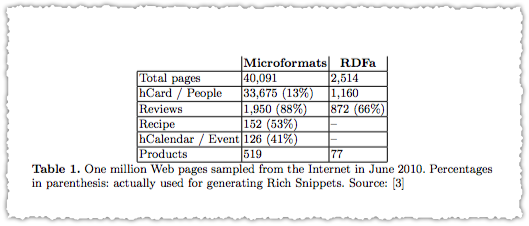
The result was a paltry 4.3% using any type of structured data and only 0.7% being used to generate rich snippets. A 2014 report from Searchmetrics indicates that the adoption hasn’t grown much in the intervening time.
But what’s more intriguing are the proposed ‘extended’ rich snippet examples.
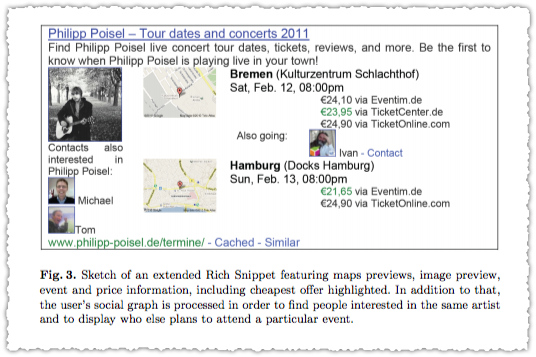
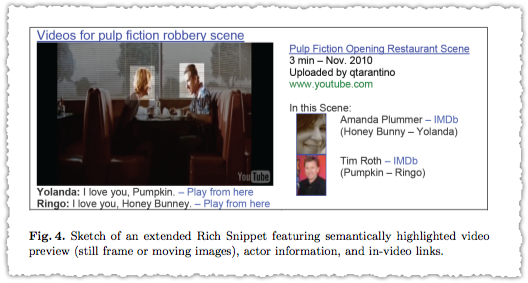
What I can’t help think looking at these is how closely they map to new Knowledge Graph panels. It’s a bit like that old Reese’s Peanut Butter commercial. But here’s the thing. If this was a video from someone other than YouTube and it included links to another site’s content I think the first site’s head would explode.
“How dare Google put links to other sites in my result!”
You can’t think that someone like, say, Last.fm would be keen to have links to Wikipedia or ticketing sites in their result for an artist query. So moving all of that to a centralized location like the Knowledge Panel is almost a necessity.
Google Killed The Radio Star
I’m using Last.fm as an example because from what I can tell Google has eliminated the music rich snippet. I can’t even get one to render using a site: operator, which leads me to believe its been deprecated. If you can get one to render please let me know.
I’m going to use the music snippet example Google provides on their About rich snippets and structured data page.
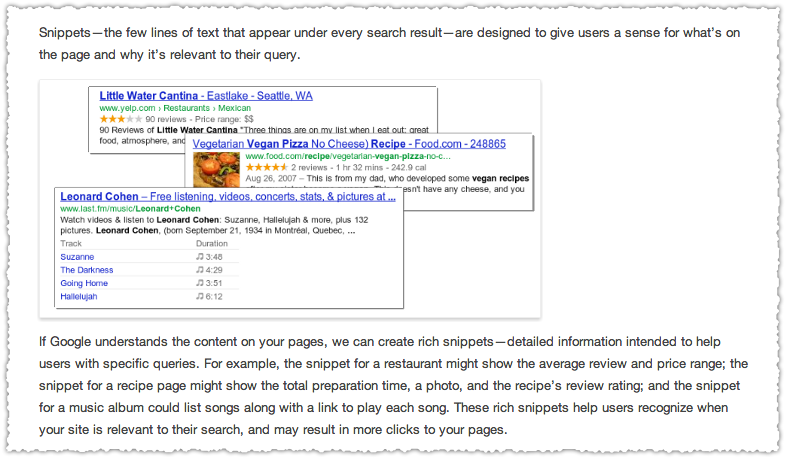
The music snippet here is for Leonard Cohen and from the bold sections of the result I’m assuming the query used to produce it was ‘Leonard Cohen’. Here’s what the Last.fm result looks like for that query today.
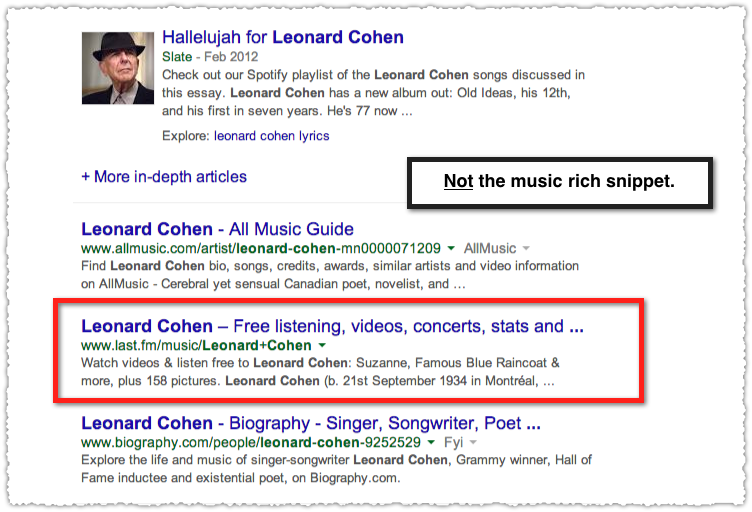
It’s the same URL but maybe Last.fm just screwed up their markup. I mean, it happens. So let’s run it through the structured data testing tool using my handy bookmarklet. (Seriously, it’ll shave hours of copy and paste work from your life!)
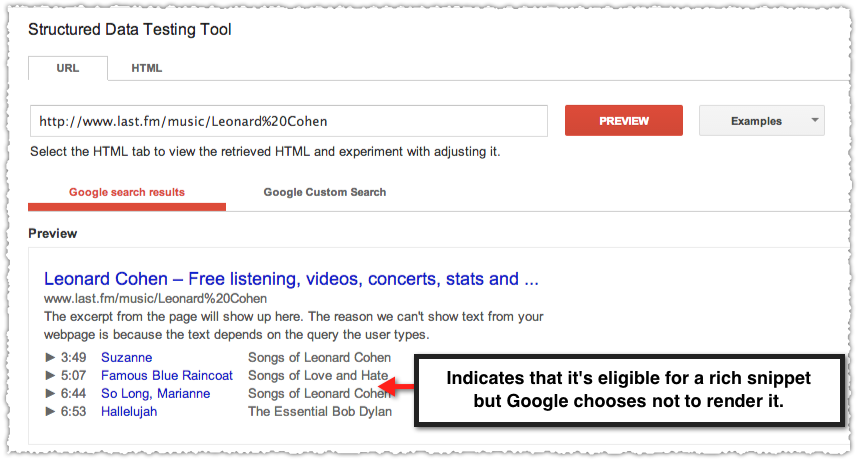
The markup is there. Google just chooses not to render it. Hey, those are the rules. And you can see why if you look at the Knowledge Panel in this search result.
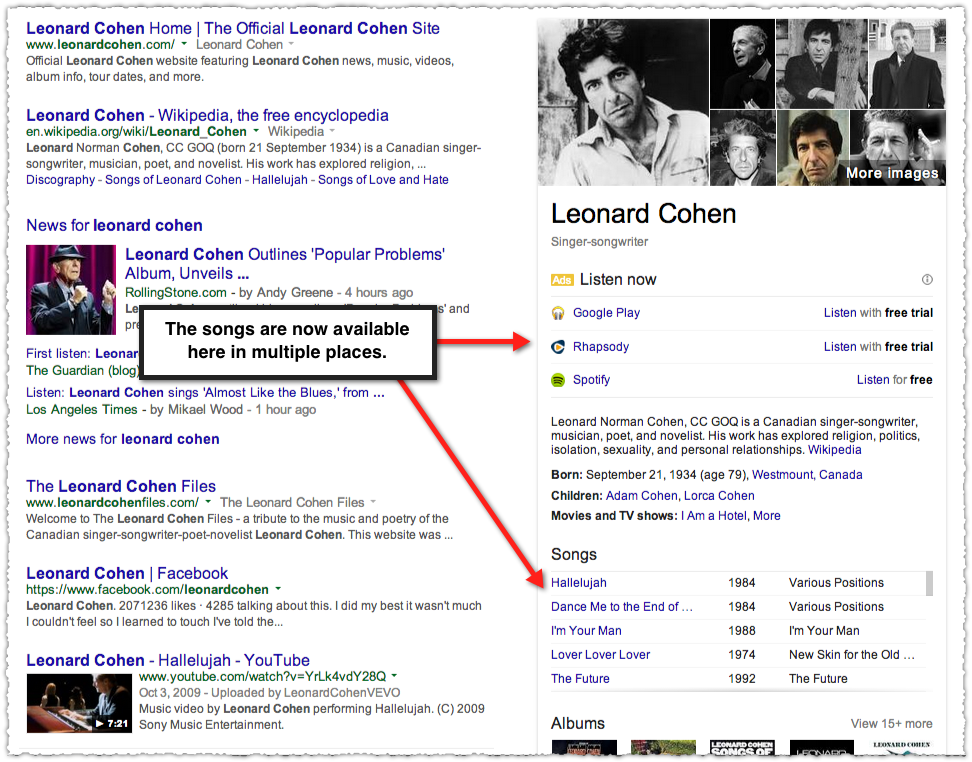
The Knowledge Panel has a ‘Songs’ section and a new ad unit to listen to music on multiple platforms. Click on any one of those songs and you get a full blown ‘songs’ carousel result.
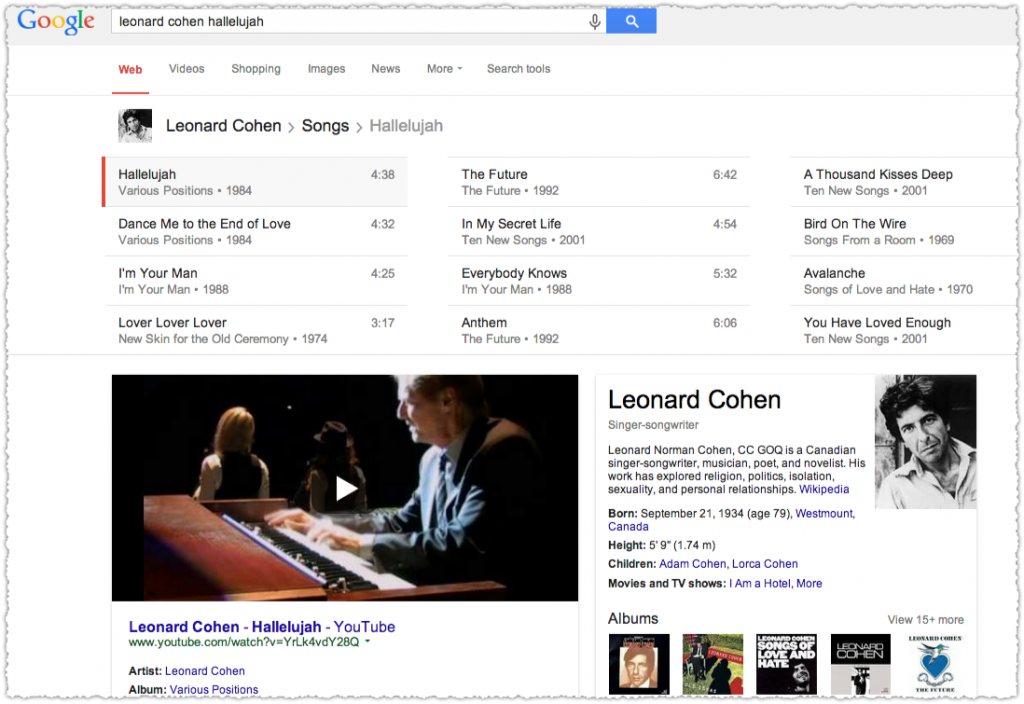
It’s pretty hard not to think this helps line Google’s pockets. It probably does.
The problem here is that sites don’t want competitive links in their Google search results and Google doesn’t want a long line of competing offers like some blinking-neon Las Vegas strip version of search results. Aggregating the various offers into one area of the page is a better user experience.
Knowledge Panels de-dupe, curate and aggregate intent for a better user experience.
The question then is how long until other types of rich snippets go the way of the Knowledge Panel?
Rich Snippets Ticket To Ride
Remember nearly 2,000 words ago when I mentioned Amazon had lost their review aggregate snippet. I took a screengrab of a specific instance of that about a week or so ago for my upcoming presentation on rich snippets.
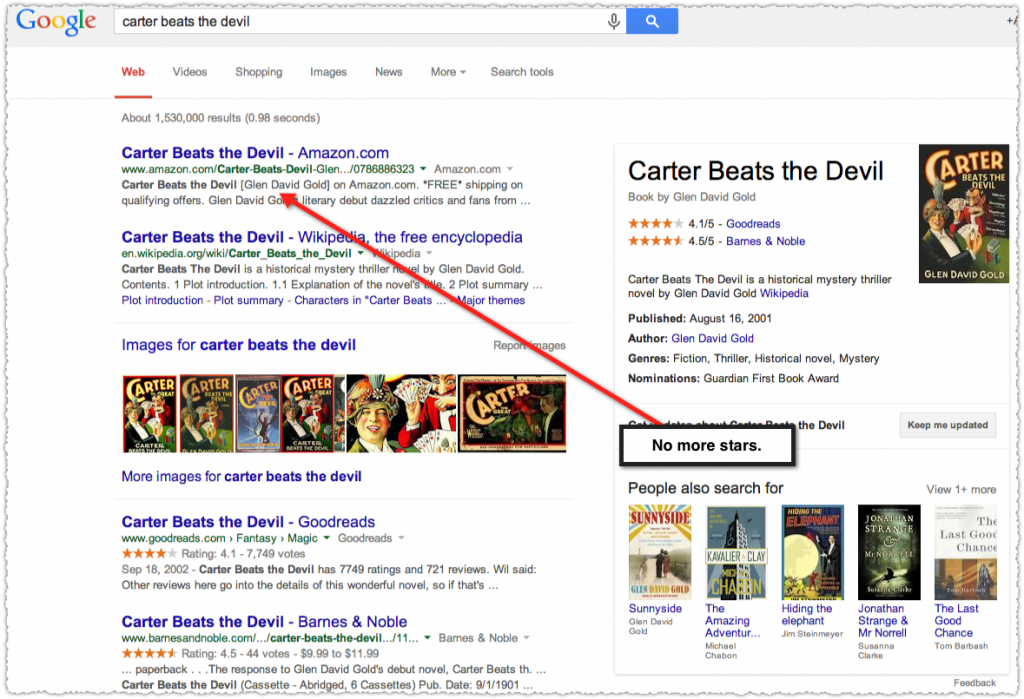
Instead of focusing on Amazon look at the two other rich snippets on the page from Goodreads and Barnes & Nobel and how they also appear in the Knowledge Panel. Now lets see how this same search looks today (August 19. 2014).
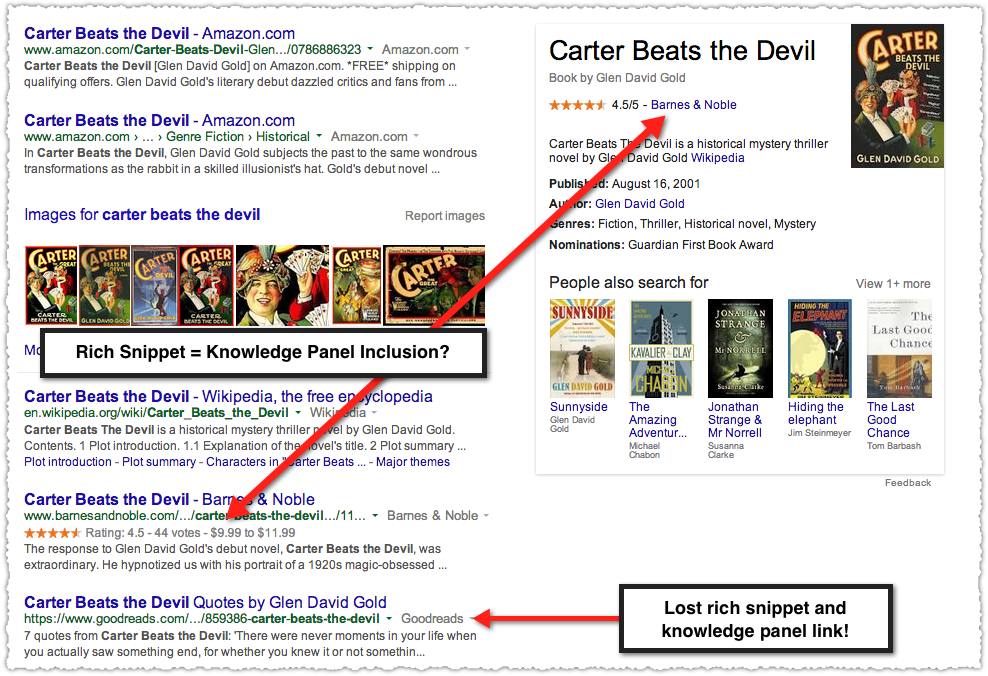
Goodreads lost their rich snippet and with it their link in the Knowledge Panel. The Goodreads result changed to one doesn’t have the review aggregate snippets markup. That’s a kick in the pants!
The review aggregate rich snippet gets you access to the Knowledge Panel unit. At least for the book vertical. And if you didn’t realize, that link to Barnes & Nobel is … a link to Barnes & Nobel. External folks!
Google doesn’t play favorites in ordering. The order in the Knowledge Panel is dictated by the order they appear in search results.
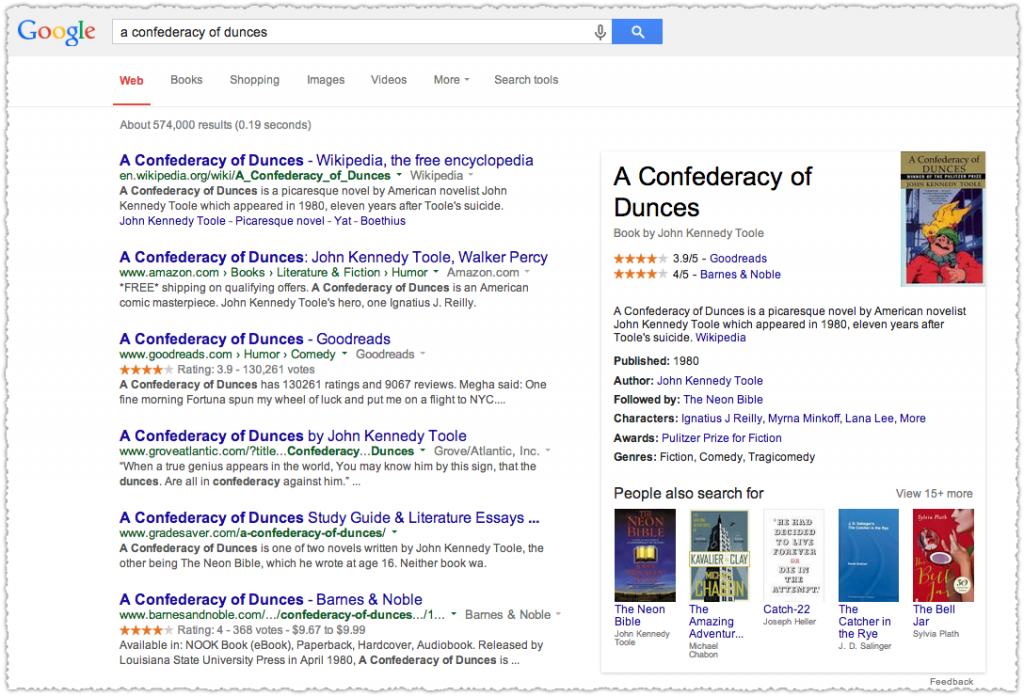
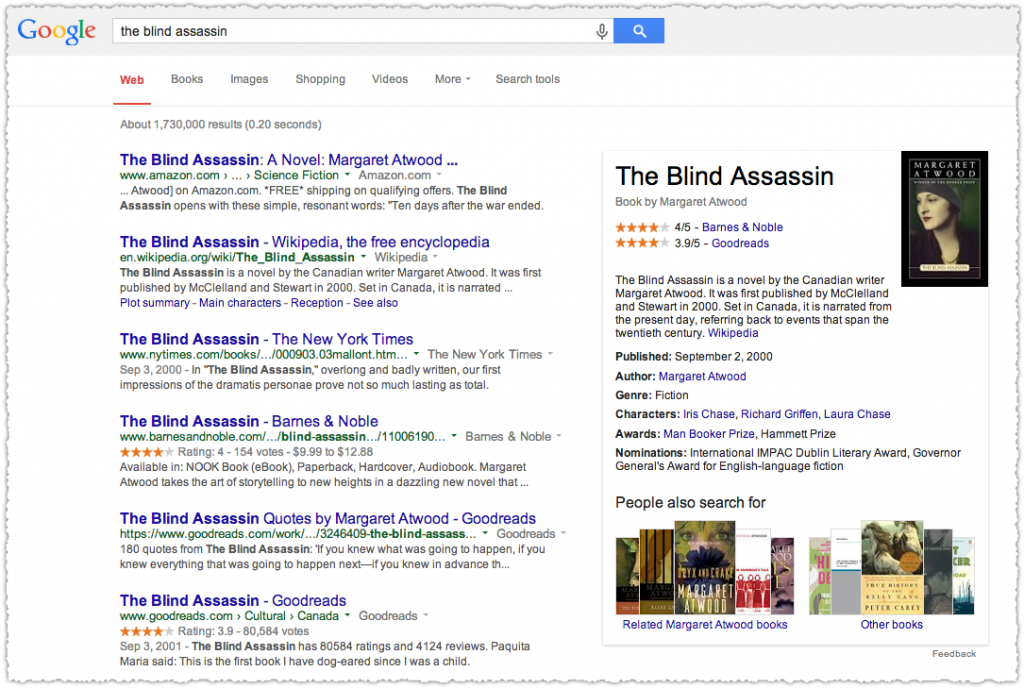
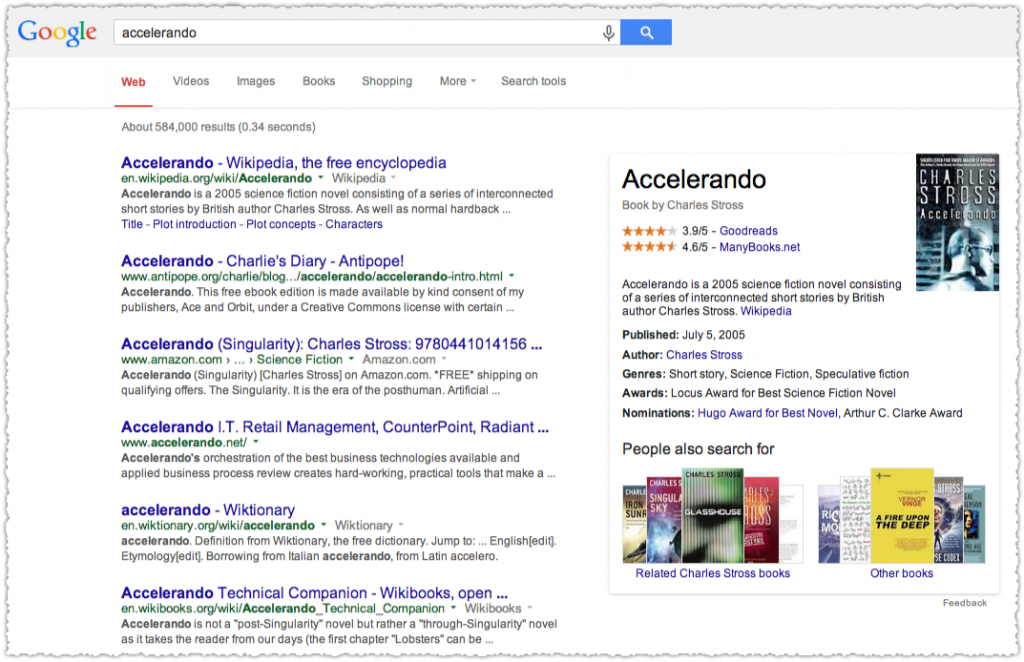
I included the last one here to show that other sites do qualify if they get their review aggregate rich snippet on the first page. ManyBooks is 8th on the ‘accelerando’ result.
But looking further down the road might Google simply remove all the rich snippets and aggregate them in the Knowledge Panel unit? Or maybe they’d only do that if the query was more specific and contained the word ‘review’. On a lark I tried ‘blind assassin reviews’.
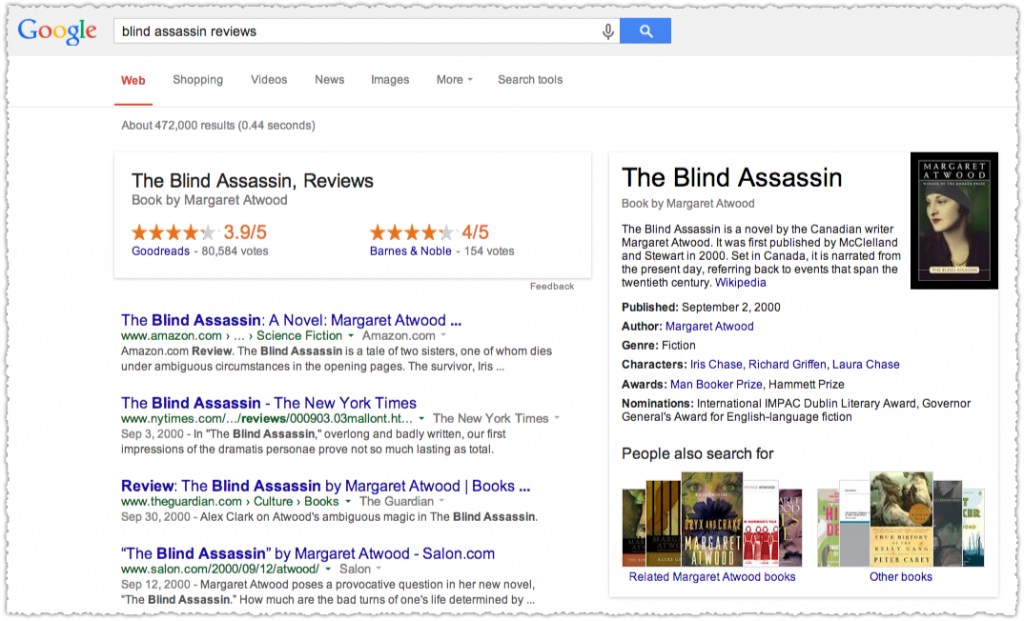
Will you look at that! Now both Goodreads and Barnes & Nobel have a starred result front and center. The rich snippets still show up in the individual results but it’s almost immaterial given this presentation. How about another?
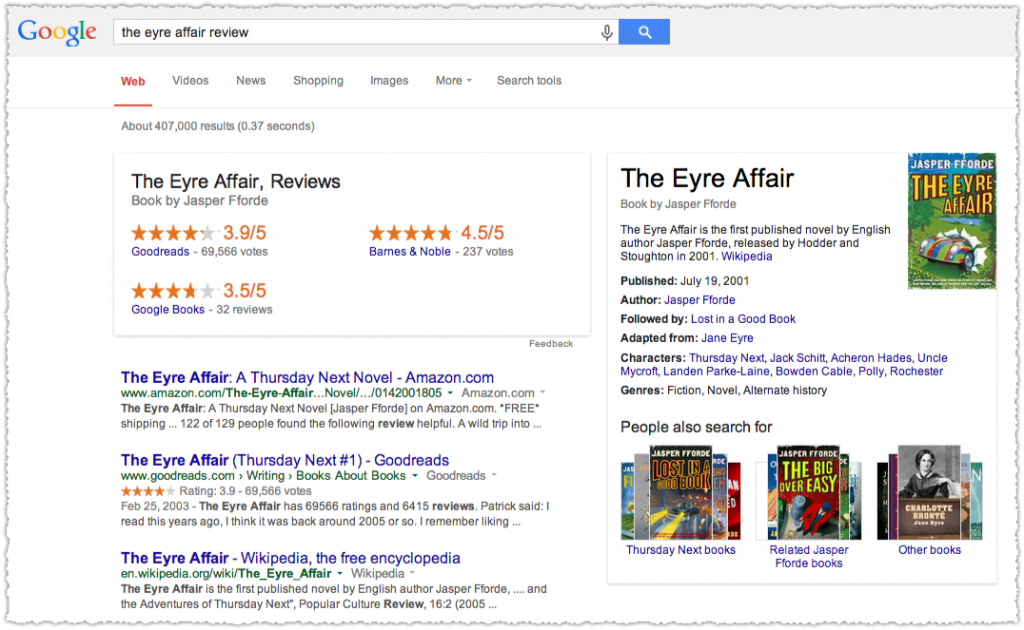
All three sites that have review aggregate rich snippets on page one also get this monstrous book reviews unit. I don’t know about you but it certainly feels like change is coming.
It’s easy with books because there is one representation of this ‘work’. The connection between the entity represented in the snippet and the Knowledge Panel is straight-forward.
But there is not just one funny cat video! However, could you decide that there is one representation for a ‘dish’? Might a new recipe Knowledge Panel include one big image and links to individual recipes from sites using the recipe rich snippet?
It doesn’t seem so far-fetched to me.
Rich Snippets Redux
Pulling myself out of the rabbit hole here’s what I’ve learned.
The Rich Snippets Algorithm Got Smarter
The new rich snippets algorithm clearly draws on site quality signals and may also be looking for topical expertise. Sites impacted by Panda will see both a reduction in rank and a suppression of any rich snippets.
Query Syntax Changes Search UX
Google is adopting new user interfaces for query syntax that indicate specific intent. The number of rich snippets and other visual elements change based on certain modifiers. Knowledge Panels in particular serve to de-dupe, curate and aggregate user intent.
Rich Snippets Are Linked To Knowledge Panels
In some instances rich snippets are being deprecated in lieu of Knowledge Panels (such as music) while other times rich snippets provide access to prime Knowledge Panel real estate.
So while the landscape continues to shift beneath our feet I believe implementing structured data is one of the smartest moves you can make given Google’s clear and continuing efforts around entities, the knowledge graph and Knowledge Panels.
The Next Post: Image Sitemap Indexation
The Previous Post: Twitter Analytics

23 trackbacks/pingbacks
Comments About The Rich Snippets Algorithm
// 50 comments so far.
Jim Robinson // August 20th 2014
Very insightful post, AJ. I wonder if we’re going to start seeing more of the Knowledge Panel results actually becoming the primary page content returned in response to certain queries (particularly on mobile). Look at stock symbols. Google’s own result fills the entire screen on mobile devices. Granted it’s a rare case where Google has effectively become a publisher, but it shows they’re not always objective. Some result types may even be based on partnerships or sub sets of trusted sites (at least initially).
AJ Kohn // August 20th 2014
Thanks Jim. I think we will see Knowledge Panels become a more central part of the page content in the future based on specific query syntax.
Google’s aim remains the same – to get people to the information they seek in the shortest amount of time possible. What might confound many publishers is that many users don’t want to click to get very basic information. Further, the Knowledge Panels provide a way to aggregate intent.
Not shown here but important are Knowledge Panels for restaurants like Va de Vi. That Knowledge Panel aggregates and answers a variety of intent such as ‘Is it open?’, ‘Where is it?’, ‘How do I get there?’, ‘How much does it cost?’, ‘Is it good?’, ‘Can I make a reservation?’, ‘What’s on the menu?’ and ‘What other restaurants could I go to instead?’.
I think the trick here is ensuring Google rewards the publishers they’re aggregating so that those sources of information continue to exist.
Mark Traphagen // August 20th 2014
I’ve never thought of this before, but it seems conceivable now with what you’ve shown here that one day Authorship could become a Knowledge Panel result. This would comport with my present guess that when the day comes that Google decides to do something useful with author entity data in search, it will be only for the top-tier trusted authors in a given topic.
I could see two kinds of Authorship Knowledge Graph results:
1) A Knowledge Panel to the right for queries with a trusted author’s name included. It would show a name, author photo, maybe brief bio info, and then a listing of a selection of his/her top online content. What content shows could be relevant to the searcher’s query (“aj kohn rich snippets”) and/or to the searcher’s search history.
2) An In-Depth Articles type box that shows content by three top-trusted authors relevant to the searcher’s query.
AJ Kohn // August 20th 2014
No doubt about it Mark! Earlier this year it became clear to me that Google wouldn’t apply Authorship until it was done via entities.
The truth is they’re already doing it to a certain extent. Here’s an Author Knowledge Panel for Seth Godin. Right now the only place Google feels confident is in linking him to his books. The linked data here is structured and trusted.
But you could see how the authorship snippet (based on markup or entity detection) might provide additional data to that Knowledge Panel such as ‘Blogs’ and ‘Recent Posts’. Unfortunately, I don’t think Google can confidently make those connections yet. They want to and I think they’ll get there but it’s going to take some time.
Andrew Cilio // August 20th 2014
Holy hell, how have I missed that Structured Data bookmarklet!? Thanks for this, and the article.
Out of curiosity, do you think Google is using all or most of a site’s structured data towards understanding what user intent a page is best serving?
For instance, if I have an article that lists a product and ~750 words about that product, it may be hard for a search engine to determine if this is a product page or a technical article–both are best serving entirely different types of searches. If my structured data says this is indeed an article (and not a product page), do you feel Google would use this data to serve this particular page for more research-based queries as opposed to purchase-based searches?
Basically, in your opinion is Google using a website’s structured data to understand what user intent a certain webpage best serves, thus influencing what pages they rank organically?
AJ Kohn // August 20th 2014
I created that bookmarklet out of necessity Andrew! Such a pain in the ass to copy and paste all the time. #firstworldproblem
I think it makes sense that Google would use the structured data to help qualify intent. They’re far more knowledgable about all of the code being used and regularly parse unstructured data to create those pseudo rich snippets (like results snippets). So I can’t see why they wouldn’t integrate the structured data they see to assist in their evaluation as well.
I’m not sure they’re doing it now but it’s a logical alternative use of the markup.
Joe Doodleboodle // August 20th 2014
Ah-ha, you were working for Power Reviews around 2010. That may explain why they seemed surprisingly competent in their product’s SEO effectiveness.
AJ Kohn // August 21st 2014
Joe,
They had a great team at PowerReviews and took my SEO recommendations to build a best of breed product. They just didn’t win the marketing war.
Chris (from L.C.) // August 20th 2014
@Mark There used to be something very similar to your #1. There was a knowledge box on the right for results connected to a Plus page, with 1-3 G+ post snippets there. It didn’t last long, but I think it could come back in the permutation that you describe.
Sundeep // August 20th 2014
They should at least compensate webmasters for using the information in rich snippets and making web search experience better for Google’s users.
AJ Kohn // August 21st 2014
I think the traffic Google sends via those links in the Knowledge Panel is the compensation.
Rick Bucich // August 20th 2014
Great post AJ!
“skate where the puck’s going, not where it’s been”
Mark makes a great point about applying Authorship to the Knowledge Graph, I don’t think that horse is dead yet, all signals suggest that topical expertise and trust are signals Google wishes to mine effectively. I still recommend setting up Authorship even if there isn’t a clear payoff, but doing so without pursuing an audience is a big mistake. The latter is far more important than the former.
AJ Kohn // August 21st 2014
Thanks Rick.
I don’t think Authorship via the Knowledge Graph is dead just … off in the future. I still recommend implementing the mark-up since it may speed the connection to and inclusion in some vast ‘person’ entity graph. The ‘people’ Knowledge Panels show how this might render for a broader set of people at some future date.
Marios Alexandrou // August 21st 2014
Do you think that a discrepancy between what is shown in the GWT Search Appearance->Structured Data section and the rich snippets testing tool is another indication of suppression? For example, the testing tool shows ratings, but the data in the Structured Data section there are 0 pages with the ratings data type.
AJ Kohn // August 21st 2014
That’s an interesting question Marios. I don’t know the answer offhand but I’ll definitely look into it.
However, both of those sources of data are wobbly. They’ve both gotten a bit better recently but the GWT data can sometimes lag and the testing tool can often provide false positives or negatives.
leo // August 21st 2014
Great article and thanks for the sharing, i was not yet aware that serp snippets could have a huge influence regarding visibility on google and since i know nothing about algorythms, your post is a life saver, thanks
Donna // August 21st 2014
Awesome article. One thing you may want to look into down the road is that it seems as though the Knowledge Panel had a knock-on effect on the types of results displayed in the first 10 results of the serps. For client confidentiality reasons, I can’t give specific keyword examples, but in general, if the pre-knowledgepanel serps had 7 out of 10 scientific types of results for a science-y phrase and 3 other types of results (ecommerce, etc.), the Knowledge Panel algo drastically changed that. Now, if a science-y serps result has a panel, then most of the old scientific results for the phrase are missing from the top 10, leaving maybe 1 or 2 from science sites, and the rest from other types of sites (some relevant, some really stretching the meaning of relevance).
AJ Kohn // August 21st 2014
Thanks Donna and I love hearing about more experiences with Knowledge Panels and how certain types of query syntax change both the configuration and content in a search result.
Your example leads me down the ‘curation’ path. If Google believes that the intent behind a certain syntax is informational and science related perhaps the idea is the Knowledge Panel provides the place where they display the collection of resources that match that intent/syntax combination. That then frees up the normal SERP to handle any additional or secondary intent that might be served by that query.
So in essence, the Knowledge Panel becomes the primary intent vehicle and the results the secondary intent vehicle. This makes even more sense when you think of Google’s ‘mobile first’ direction.
Mark Traphagen // August 21st 2014
@chris Yes I remember that. It was similar to what they now give brands that have a verified and active Google+ page.
Emma Barnes // August 22nd 2014
This is a fantastic post AJ! Really in depth and interesting at the same time.
I don’t have anything clever to add so I’ll add this for people’s amusment: the Ombre Hair example makes me think of Syndrome from The Incredibles: When EVERYONE’S marked up – NO ONE will be!
Nakul Goyal // August 22nd 2014
Great Post AJ. Ditto Andrew, how did I miss that Structured Data bookmarklet. Thanks for “mentions” to that tool. I hear the frustration.
Interesting example of Va de Vi restaurant. What I noticed was, in the KG, when you click on links under “Featured by Zagat”, the SERP does not change, the only thing that changes is the carousel.
AJ Kohn // August 22nd 2014
Correct Nakul! And the reason for that (I believe) is that Zagat is owned by Google and all of that content is integrated on the platform instead of off it.
Roland // August 22nd 2014
Great findings and accurate analysis. Thanks for putting all that together in one article.
Our team also confirms through our past researches that Google did indeed remove the radio stars. We do believe as well that the algorithms have not yet been fixed. What we are having now is like a beta or alpha release before the first stable release of the rich snippets algorithms. There are still many theories but what you had mentioned above is the most accurate analysis given the data we have at this point in time.
AJ Kohn // September 04th 2014
Roland,
Thanks for the kind words. It’s an interesting topic and one that’s evolving quickly right now. I’m glad others are investigating.
Sam Mudra // August 25th 2014
This is so far the best article I have read on rich snippet, AJ. Ditto Andrew. It is really a good way to stand out from the competitor sites on SERP and obviously to get high CTR. Thanks for writing such an informative article and sharing with us.
—
Sam Mudra
Alexander Rus // September 02nd 2014
Damn that was a good read. One of our clients (shop) lost all its review stars and other snippets after Panda 4.0.
It was combined with a traffic loss as the site had some typical Panda issues. After we fixed that traffic came back but the review stars are still a goner.
This explains a lot… Will give this another read later + all the credit links.
Greetings from Innsbruck,
Alex
AJ Kohn // September 04th 2014
Thanks for the kind words Alex and sorry to hear about your client. Usually when you get out of Panda Jail the snippets return but perhaps the rich snippets algorithm isn’t directly linked to Panda but simply updates when they reprocess Panda.
Todd McDonald // September 02nd 2014
Surprised Google is giving up ad space on the right hand side to such a visually attractive result about products (https://www.google.com/search?sourceid=chrome-psyapi2&ion=1&espv=&ie=UTF-8&q=carter%20beats%20the%20devil).
How long before they finishing testing CTR and decide to make those buyable spots with nice rich markup :)? Or perhaps this exists on this SERP because no one is bidding on the term..seems unlikely, but I’m not seeing ads up top.
Overall, this feels like one more step in Google becoming the solution. Brands are feeding them data exactly how they want it, at some point, we may all wish we hadn’t done that. Will certainly be interesting to see!
AJ Kohn // September 04th 2014
Todd,
Having worked in the book vertical, the CPC required to make PPC make sense (given razor thin margins) probably doesn’t exist anymore. So I’m not surprised that a long-tail book like this doesn’t have any ads.
Google is absolutely becoming the solution and I think the brands that realize that and partner with Google will win and those who don’t will regret it. In all, do we really think people will stop Googling because a handful of brands aren’t represented?
The question as I see it is how equitable the partnership is with brands. I think Google is smart enough – and is playing a LONG game – that they’ll keep valued brands fat and happy.
D'Anne // September 02nd 2014
Is this related? I typed into google search “funny dogs” and later did a search for “funny cats” and got the same results–a huge image of a you tube video at the TOP of the search results where display ads generally show up.
The image and “box” it was in filled the window of my laptop so the rest of the search results were not visible without scrolling.
It contained a “feedback” link underneath. If you click on it, it asks, “Wrong?” and asks you to give information to correct the result google gave you.
The rest of page 1 listings is a bar of images, then 3 results with video snippets and 6 more of the usual “plain” results. So the huge video image at the top is result 1 of 10….
AJ Kohn // September 04th 2014
It’s sort of related D’Anne. What you’ve encountered is a ‘Video Onebox Snippet’.
Google presents a Onebox when it believes it has the ‘right’ result. But they have that feedback link to help them train the algorithm. So when users say that it’s not right Google digests that and tries to correct. Right now Google is testing a lot of different Onebox presentations and you’ll often find some that aren’t quite meeting the mark.
That’s not unusual during the first phases of something like this. You’ll likely see them get better over time or abandoned on certain types of queries.
Patrick Hathaway // September 03rd 2014
Nice breakdown AJ. Found myself slipping down a few rabbit holes as I went off testing things myself along the way. You owe me an hour.
How disappointing would it be if there really was a single representation for a dish, which over time became the accepted ‘canonical’ version? What a way to crush creativity. When I search for recipes I tend to look through a few, find some I like the sound of then smash them all together in a culinary masterpiece-cum-disaster.
This sort of thing is bad enough: http://screencast.com/t/Xg8js2zhxIId
AJ Kohn // September 04th 2014
Thanks Patrick and it does get rather addictive as you follow things to their logical end.
I wouldn’t be too concerned about a single dish representation as long as individual recipes were linked to in that Knowledge Panel, much like individual bookstores are linked now. The idea would be to define, broadly, what Chicken Saltimbocca was and then provide easy links to top recipes. Those recipes would certainly be different. But the general theme of that dish would remain the same.
Because do I really need 8 thumbnails of the same dish? Ugh, no. But if Google plays favorites with those thumbnails then screams will arise from those not receiving them. So aggregation may be the only recourse.
The’How To’ Onebox isn’t my favorite, not because it appears but because it’s often not formatted well or helpful.
Zander Buteux // September 04th 2014
AJ, great insight and really appreciate the research of this SERP control aspect that seems to constantly be in a state of flux. I agree with many of your hypotheses and wonder what the Search Quality team has up there sleeve in regards to these implementations.
I have discovered a few examples of music snippets remaining outside of site search operators. The SERP URLs for these examples are below
Query: Tiesto Kaleidoscope Google Play
URL: https://www.google.com/search?q=Tiesto+Kaleidoscope+Google+Play
Query: Keith Urban Google Play
URL: https://www.google.com/search?q=Keith+Urban+Google+Play
Query: Carrie Underwood Google Play
URL: https://www.google.com/search?q=Carrie+Underwood+Google+Play
A lot of bias towards Google Play branded queries, hmm, let’s see if something else exists
Query: Keith Urban Fuse Buy
URL: https://www.google.com/search?q=Keith+Urban+Fuse+Buy
Query: Keith Urban Fuse Download
URL: https://www.google.com/search?q=Keith+Urban+Fuse+Download
Query: daft punk random access memories full album
URL: https://www.google.com/search?q=daft+punk+random+access+memories+full+album
Seems that the Google Algorithm enjoys the implementation on play.google.com. I’d suppose that if you are managing a music relevant site and are looking to boost rich snippet results, one place to start would be to emulate the play.google.com structure as that is the most consistent with the most results.
AJ Kohn // September 04th 2014
Very Cool Zander! So what this actually shows me is more evidence of query syntax dictating SERP presentation and at the same time reinforcing topical expertise.
The ‘Google Play’ modifier bring up a very specific site which has the right markup and could be considered a topical expert or a site that is devoted to music. Using an ‘itunes’ modifier brings up those pages but Apple doesn’t use any markup so it’s tough to say what would happen there. (Dear Apple, please put some markup on these pages so we can see if this works.)
The Keith Urban examples represent an [artist] [album] [transactional modifier] query class. It’s only when using the [transactional modifier] that you get a music rich snippet from Amazon. Oddly, Amazon does have markup on these pages which is why I believe they get this result. Amazon is a topical expert in music retail so the query syntax matches.
The Daft Punk example doesn’t render a music rich snippet so I can’t offer anything there. My take away is that you must have the markup to play ball but that you might not get it if Google doesn’t view you as a topical expert for that specific query syntax.
Thanks again for this research Zander. It definitely moves the conversation further forward.
darren // September 04th 2014
Thanks for the post AJ. I have had a few aha moments, I am off now to a bit of investigating of my own will report back. Really interesting topic.
Many Thanks
Todd McDonald // September 04th 2014
@AJ
“Having worked in the book vertical, the CPC required to make PPC make sense (given razor thin margins) probably doesn’t exist anymore. So I’m not surprised that a long-tail book like this doesn’t have any ads.”
-Even if no one else is bidding either? 🙂
“Google is absolutely becoming the solution and I think the brands that realize that and partner with Google will win and those who don’t will regret it. In all, do we really think people will stop Googling because a handful of brands aren’t represented? ”
-I’m with you on this, but I think the “solution” is going to look more…sinister, shall we say, than “partner” for brands at the end of the day. Yes, they’ll need to be careful who they mess with and how they do it, but I think there are plenty of ways for them (Goog) to make the situation look more like a 70-30 than a 50-50.
I don’t see a lot of ways for brands to fight back since Google basically has a monopoly on search. If I were a brand (or business at all), I would be working oh so very hard to get my users to come straight to me and get them into my ecosystem (duh..I know). I think Nike, Starbucks, and some others do this well across the digital space and have nice connections between online and offline experience (they get that it’s one experience), but surprisingly many major players don’t.
Will be interesting to see how it shakes out, but I really don’t think many businesses are as aware of the potential for Google to put themselves in the middle of many, many more transactions as they should be.
Love the thinking and post as always!
AJ Kohn // September 05th 2014
@Todd
Bidding on long-tail book terms is a losing proposition for the most part these days. So yeah, I’m not surprised.
And I tend to think that Google will be a better partner than say, Amazon or Walmart. It’s not that Google will be overly generous but I don’t think they have any real incentive to make life miserable for brands. The opposite in fact.
But you’re right, it’s up to the brands to find ways to ensure that repeat customers don’t find them through search. It’s one of the bigger things I look at for clients – repeat visitors through search. Those who find ways to bring users back through other channels will survive and thrive, those who don’t will subsist on Google’s good (for now) will.
Because at some point Google may decide to disintermediate the vertical they sit in.
Todd McDonald // September 05th 2014
@AJ
I’ll take your word on the bidding – I’m sure the margins are terrible as you said. I know very little about that space (clearly).
I’ll go with you on being a better partner than Amazon or Walmart – I suppose if it wasn’t Google it would be something/someone else right?
Onward as always
Nico // September 08th 2014
Hi AJ,
you nailed it with this article, too 🙂
When using the word “review” I just found out, that currently the “monstrous review box” seems to be limited to three sites. Moreover, it seems to prefer only established known review sites, i.e. Rotten Tomatoes, Imdb, Metacritic when there are more and also well-ranked other review sites (that in fact have review aggregate snippets in the main search results).
One example for this behavior would be: “the hangover reviews“, where the fairly unknown domain rogerebert.com is ranked #2 but does not appear in the review box.
AJ Kohn // September 08th 2014
Nico,
Thanks for looking at the reviews space for movies. In the example there’s a bit of nuance here that explains things. The three sites getting the monstrous review box are using review aggregate (or aggregaterating if I’m being precise) but the others, including Roger Ebert, are using review – as in one review.
That’s in line with what I’ve found previously. Google is promoting those sites using aggregaterating but not those with an individual review.
Lee Kennedy // September 19th 2014
Hey AJ–I tweeted at you but want to say again: I’ve been working with a particularly troubling problem with a client not being able to get review snippets to show up for certain pages, and this post gave me some great insight into it.
I tested it out based on your “site quality” prediction and it looks like there are some page-level quality signals that are allowing the snippet to show up for some pages and not others. This is super helpful, as we’ll be able to tell if changes we make are good/bad based on the snippet showing up or not. So thanks and great post!
Arim // October 10th 2014
Thanks for the great article! Do you know if it possible to change your rich snippets? A couple of weeks ago I started to rank nr 2 for a very competitive keyword in Sweden and because of that (well it has to be) I got four rich snippet links to landing pages on my domain.
The thing is that Google choosed the four rich snippet links and even though I believe it’s improving my CTR from the serp I think it would improve even more if I was able to choose wich rich snippet links to show.
AJ Kohn // October 10th 2014
Arim,
You’re talking about one-line sitelinks in a snippet and those are very hard to change. Usually Google selects them based on the structure of the page (anchors or tabs) or based on the places people go the most from that page and looking at the anchor text of those links. So I’d start there and see if you can massage those areas and see if Google changes the sitelinks. Be careful though you don’t want to lose the links all together.
Jackson Lo // November 10th 2014
Hey AJ – great post! It’s fascinating how much the SERPs have evolved in such a short time period. But as you mentioned, I think what’s really grown is Google’s Knowledge Graph project. Seeing those rich snippets now above the main results (as answers), is awesome for those of us who are looking for a quick answer, but worse for website owners that want traffic to their site. Probably the main reason for Google to lessen rich snippets in organic results and to provide them as “answers” is due to the rise in mobile and tablet usage. So is Google becoming a quick “question and answer” engine? Seems like it. But while they’re helping us save time, they’re also putting their bets (and our trust) in their partnership sites that use their content as answers. Let’s hope it doesn’t go horribly wrong.
I was testing a few searches, and I think you’ll find this interesting too. For books that have turned into movies, I wanted to see which Google would choose over the other. No surprise, after a few searches the movie results came up first. Movie results (searches for movie names) typically will rank higher than books, so that might be factor they consider when deciding to display review stars as answers above the results (i.e. a search for “life of pi review” gave me 2 sources where Google drew ratings from and a search for “life of pi review book” gave me one). I did the same for The Notebook. Here are some links:
https://www.google.ca/search?q=life+of+pi+review
https://www.google.ca/search?q=life+of+pi+review+book
https://www.google.ca/search?q=the+notebook+reviews
https://www.google.ca/search?q=the+notebook+reviews+book
Sometimes I wonder if Google is trying to get people to perform less clicks on their domain. Because if that’s one of their goals, then it’s working, at least I’m the sucker for these kinds of things 🙂
AJ Kohn // November 12th 2014
Jackson,
Thanks for the great comment and examples. I think the goal is to get users to the answers they want faster. Now the review space is intriguing. Because at a glance some users might just want to know ‘how good is this piece of entertainment’. But others will want to know the details and will have to click to read more.
So I think these types of interfaces are built to satisfy multiple intents, some of them shallow and immediate and others deeper and more complex. That said, you’d think Google might highlight the individual reviews at some point in the Knowledge Panel for those looking for ‘professional’ reviews.
In addition, it’s my belief that by satisfying the shallow and immediate so quickly, users are encouraged to query again, perhaps another shallow query but ultimately to a more complex one. So while each individual query may not lead down a third-party click path I think the query session ultimately does more often than not.
Levent Cem Aydan // January 01st 2015
This is probably the best guide I’ve ever seen in my life about rich snippets. I am bookmarking this and sharing this on twitter, and I will be coming back and forth to this guide. Thank you so much AJ!
AJ Kohn // January 02nd 2015
Thank you for the kind words Levent. It’s an interesting and evolving area to watch in 2015.
Selvam // May 28th 2015
Hi Kohn
For the past couple of weeks i have noticed that Google drops rich snippets for my site search results and i really don’t know why. But it Google returns rich snippets when i use site:domainname.com
After went through your insights about rich snippets, is it possible to retrieve back the rich snippets in Google search results for my domain?
Gary Belfast // January 26th 2018
Really interested in developing a rich snippets strategy and will dig into this article.
Gary
Sorry, comments for this entry are closed at this time.
You can follow any responses to this entry via its RSS comments feed.